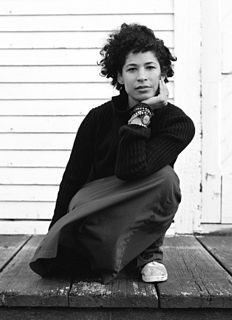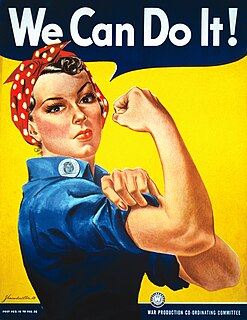Feminism is a range of political movements, ideologies, and social movements that share a common goal: to define, establish, and achieve the political, economic, personal, and social equality of the genders. Feminism incorporates the position that societies prioritize the male point of view, and that women are treated unfairly within those societies. Efforts to change that include fighting gender stereotypes and seeking to establish educational and professional opportunities for women that are equal to those for men.
Liberal feminism is an individualistic form of feminist theory, which focuses on women's ability to maintain their equality through their own actions and choices. Madiha Mazhar said Its emphasis is on making the legal and political rights of women equal to men. Liberal feminists argue that society holds the false belief that women are, by nature, less intellectually and physically capable than men; thus it tends to discriminate against women in the academy, the forum, and the marketplace. Liberal feminists believe that "female subordination is rooted in a set of customary and legal constraints that blocks women's entrance to and success in the so-called public world". They strive for sexual equality via political and legal reform.
This is an index of articles related to the issue of feminism, women's liberation, the women's movement, and women's rights.
Postcolonial feminism is a form of feminism that developed as a response to feminism focusing solely on the experiences of women in Western cultures. Postcolonial feminism seeks to account for the way that racism and the long-lasting political, economic, and cultural effects of colonialism affect non-white, non-Western women in the postcolonial world. Postcolonial feminism originated in the 1980s as a critique of feminist theorists in developed countries pointing out the universalizing tendencies of mainstream feminist ideas and argues that women living in non-Western countries are misrepresented.
Second-wave feminism is a period of feminist activity and thought that began in the United States in the early 1960s and lasted roughly two decades. It quickly spread across the Western world, with an aim to increase equality for women by gaining more than just enfranchisement.

Third-wave feminism is an iteration of the feminist movement that began in the early 1990s United States and continued until the fourth wave began around 2008. Born in the 1960s and 1970s as members of Generation X, and grounded in the civil-rights advances of the second wave, third-wave feminists embraced individualism and diversity and sought to redefine what it meant to be a feminist. According to feminist scholar Elizabeth Evans, the "confusion surrounding what constitutes third-wave feminism is in some respects its defining feature."
Socialist feminism rose in the 1960s and 1970s as an offshoot of the feminist movement and New Left that focuses upon the interconnectivity of the patriarchy and capitalism. Socialist feminists argue that liberation can only be achieved by working to end both the economic and cultural sources of women's oppression. Socialist feminism is a two-pronged theory that broadens Marxist feminism's argument for the role of capitalism in the oppression of women and radical feminism's theory of the role of gender and the patriarchy. Socialist feminists reject radical feminism's main claim that patriarchy is the only or primary source of oppression of women. Rather, socialist feminists assert that women are unable to be free due to their financial dependence on males. Women are subjects to the male rulers in capitalism due to an uneven balance in wealth. They see economic dependence as the driving force of women's subjugation to men. Further, socialist feminists see women's liberation as a necessary part of larger quest for social, economic and political justice. Socialist feminists attempted to integrate the fight for women's liberation with the struggle against other oppressive systems based on race, class or economic status.
The term postfeminism is used to describe reactions against contradictions and absences in feminism, especially second-wave feminism and third-wave feminism. The term postfeminism is sometimes confused with subsequent feminisms such as 4th wave-feminism, and "women of color feminism".
Cultural feminism is the view that there is a "female nature" or "female essence" or related attempts to revalidate attributes ascribed to femaleness. It is also used to describe theories that commend innate differences between women and men.
Material feminism highlights capitalism and patriarchy as central in understanding women's oppression. Under materialist feminism, gender is seen as a social construct, and society forces gender roles, such as bearing children, onto women. Materialist feminism's ideal vision is a society in which women are treated socially and economically the same as men. The theory centers on social change rather than seeking transformation within the capitalist system. Jennifer Wicke, defines materialist feminism as "a feminism that insists on examining the material conditions under which social arrangements, including those of gender hierarchy, develop... materialist feminism avoids seeing this gender hierarchy as the effect of a singular... patriarchy and instead gauges the web of social and psychic relations that make up a material, historical moment". She states that "...materialist feminism argues that material conditions of all sorts play a vital role in the social production of gender and assays the different ways in which women collaborate and participate in these productions". Material feminism also considers how women and men of various races and ethnicities are kept in their lower economic status due to an imbalance of power that privileges those who already have privilege, thereby protecting the status quo. Materialist feminists ask whether people have access to free education, if they can pursue careers, have access or opportunity to become wealthy, and if not, what economic or social constraints are preventing them from doing so, and how this can be changed.
Postmodern feminism is a mix of post structuralism, postmodernism, and French feminism. The goal of postmodern feminism is to destabilize the patriarchal norms entrenched in society that have led to gender inequality. Postmodern feminists seek to accomplish this goal through rejecting essentialism, philosophy, and universal truths in favor of embracing the differences that exist amongst women to demonstrate that not all women are the same. These ideologies are rejected by postmodern feminists because they believe if an universal truth is applied to all woman of society, it minimizes individual experience, hence they warn women to be aware of ideas displayed as the norm in society since it may stem from masculine notions of how a women should be portrayed.

Antifeminism is opposition to some or all forms of feminism. Antifeminists in the late 19th century and early 20th century resisted women's suffrage, while antifeminists in the late 20th century in the United States opposed the Equal Rights Amendment. Others, particularly in the 21st century, see antifeminism as a response to an ideology rooted in hostility towards men.
Lipstick feminism is a variety of third-wave feminism that seeks to embrace traditional concepts of femininity, including the sexual power of women, alongside feminist ideas.
Equity feminism is a form of liberal feminism that advocates the state's equal treatment of women and men, without challenging inequalities perpetuated by employers, educational and religious institutions, and other elements of society. The concept has been discussed since the 1980s. Equity feminism has been defined and classified as a kind of classically liberal or libertarian feminism, in contrast with social feminism, difference feminism gender feminism, and equality feminism.
A variety of movements of feminist ideology have developed over the years. They vary in goals, strategies, and affiliations. They often overlap, and some feminists identify themselves with several branches of feminist thought.
Analytical feminism is a line of philosophy that applies analytic concepts and methods to feminist issues and applies feminist concepts and insights to issues that have traditionally been of interest to analytic philosophers. Like all feminists, analytical feminists insist on recognizing and contesting sexism and androcentrism.

The feminist movement refers to a series of political campaigns for reforms on issues such as reproductive rights, domestic violence, maternity leave, equal pay, women's suffrage, sexual harassment, and sexual violence, all of which fall under the label of feminism and the feminist movement. The movement's priorities vary among nations and communities, and range from opposition to female genital mutilation in one country, to opposition to the glass ceiling in another.
Fourth-wave feminism is a phase of feminism that began around 2012 and is characterized by a focus on the empowerment of women and the use of internet tools. Centered on intersectionality, the fourth wave examines the interlocking systems of power that contribute to the stratification of traditionally marginalized groups. Fourth-wave feminists advocate for greater representation of these groups in politics and business, and argue that society would be more equitable if policies and practices incorporated the perspectives of all people.


